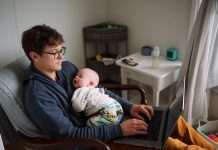
More than once, I’ve had someone tell me that, for stay-at-home parents like me, every day is a Saturday. They’re implying that since I don’t work a “real job” I enjoy leisurely, unstructured days doing whatever I want. This couldn’t be farther from the truth. I know this because, if I did work a “real job,” I would have to pay someone else—a few people, actually—to do everything that I do as a stay-at-home mom.
So I’m quick to reply, “Actually, being a stay-at-home parent means that every day is a Monday.” My work never ends, and just like any other job, no matter how much I love it, no matter how much joy and satisfaction it brings me, no matter the fact that it turned out to be my dream job, it can be stressful and frustrating and hard. Ruth Bader Ginsburg once said, “Each part of my life provided respite from the other and gave me a sense of proportion that classmates trained only on law studies lacked.” As a stay-at-home mom to very young children, I severely lacked respite—there was no break from the demands of the job. I went to sleep each night knowing a full week of work awaited me and woke up knowing the same thing.
I’m not writing this to argue that stay-at-home parents have it harder than working parents. Being a parent is challenging no matter what the family arrangement. But I do want to dispel the notion that staying home—especially with babies and toddlers—means sleeping in, brunching, shopping, and napping. I’m sure there’s a minority of stay-at-home parents with nannies and housekeepers and cooks who have free time to devote to activities of their choosing, but for most of us, we’re doing it all with very little support.
Some of the hard parts of stay-at-home work I’m about to share may be universal to anyone with a job, but some aspects are unique. For example, our work results in complete financial dependence on someone else.
Routine and Monotony
When I was home with my toddler and baby, the days blended together, a mash-up of mental calculations to see how many errands I could squeeze in before nap time followed by a race against the clock to make it home before a melt down. The routine is monotonous but also unpredictable. The days are both emotionally and physically draining—kids can throw a wrench in the plans at any moment. .
When my children were both toddlers, I averaged, at max, two hours out of the house every day. That left 22 hours of my day at home, and most of my waking hours were spent apart from other adults. My children were my primary companions—and toddlers happen to be awfully self-centered and terrible conversationalists.
I spent my hours at home completing a rotation of mundane tasks: preparing food, distributing food, cleaning up food, dressing children, chasing after them, changing diapers, cleaning up toys, re-cleaning toys, sorting laundry, folding laundry, and putting away laundry. I summoned every ounce of patience I had to interact with my kids as a “good” mother should, even though I simultaneously felt like I wasn’t spending enough quality time with them. I was distracted by so many other tasks—the dishes, in fact, can only wait so long.
I couldn’t complete any one of my chores without being interrupted to attend to something else. If you’re familiar with the concept of “flow,” you’ll know this way of working is immensely frustrating and disruptive.
At the same time, the cadence of life at home includes lulls and downtime, but the moments never seem long enough to actually do anything of substance—it’s just enough time to scroll social media or reply to a friend’s text that she sent three days ago.
By the end of the day, I couldn’t tell you what I did—what I’d accomplished. My work was invisible and erasable; it all had to be done the next day, too—but I promise you this, if I didn’t do what I did all day, you would notice immediately.
Dependence and Identity
Staying home also meant giving up my independence and personal identity. I sacrificed financial freedom when I resigned from my job. By making this choice, I’ve also risked stunting my career growth and earning potential permanently—after a long gap in employment, it’ll be challenging to pick up where I left off.
I also lost the autonomy to move about the world by myself. My husband, working full time, has always enjoyed the freedom to plan his daily schedule without worrying about who will watch the kids. He can grab an impromptu coffee with a friend during his work day without considering where the kids are or who is with them. As one of my favorite articles explained, “Being a Stay-at-Home Parent Is a Luxury… for Your Spouse.”
Some of my girlfriends sneak away at lunch for manicures. Two of them occasionally take off days to go to the spa together. They have the flexibility to do this because childcare for their kids is already lined up. I don’t begrudge any of them this personal time and they shouldn’t feel guilty for it, but as a stay-at-home parent to very young children, it’s simply something I couldn’t do without significant advanced coordination. I essentially had to ask someone’s permission before I could schedule a doctor’s appointment, haircut, or any other kid-free activity. “Husband, can you be home by 4:00, so I can do this?” “Babysitter, are you available to watch my kids for a few hours tomorrow?”
I was free to decide whether to take the kids to the library or music class on Wednesdays, but my days centered fully around the needs of other people. Compounding the lack of independence was the lack of personal achievement. While I find it incredibly satisfying to be the foremost expert in my children’s personalities, to know their needs and their ever-changing likes and dislikes, to be the recipient of the most hugs and kisses every day, it’s not the same as working towards personal or professional goals.
I am thankful and happy that I’ve gotten to be home with my kids, but none of this work is just for me, and it’s easy to feel like I’m doing it all wrong. Strangers are far more quick to judge me than to tell me I’m doing a good job. I don’t have the chance for a raise or promotion and no one sends out an email recognizing my hard work. With children attached to me at all times, I am always someone’s mom first and an autonomous person second.
One day, I did an experiment. I got dressed in jeans and a casual top and took my children to preschool. A few hours later, I walked the same route to run some errands. On both trips, I made note of the attention I received. When I was on my own, two men walking past me made a point to engage with me. One said hello, and one told me I was beautiful (I know in the age of #MeToo I shouldn’t approve of unsolicited comments on my appearance, but you know what? I’ll take it.) Three cars passing by honked at me—another chauvinistic practice, but in this case, it was useful to my experiment. The only difference between the two trips was that I garnered male attention when I didn’t have my kids with me—not that I’d rather men honk and comment with my kids around, but without kids in tow, people saw me for me . I was more than a mother. That sounds like an unnecessary observation, but when one’s primary existence is to mother, a sense of self outside of that role is the first thing to slip away.
On the Bright Side
My children are nearly five- and six-years-old now, and I’ve never regretted the years I spent home with them. Quite the opposite really. I am grateful that I had the choice and ability to do it, but I was also very happy when they started preschool and I earned back a few hours to myself each day. My sense of independence returned and I took the opportunity to write part-time. With a better balance of time with and without the kids, I am more mentally rested and able to enjoy the time I spend with them. I finally have the respite Ruth Bader Ginsburg described.


















Love this description of stay-at-home motherhood. I feel you, girl.
Pretty solid content here.馃憤 Very user-friendly explanation..